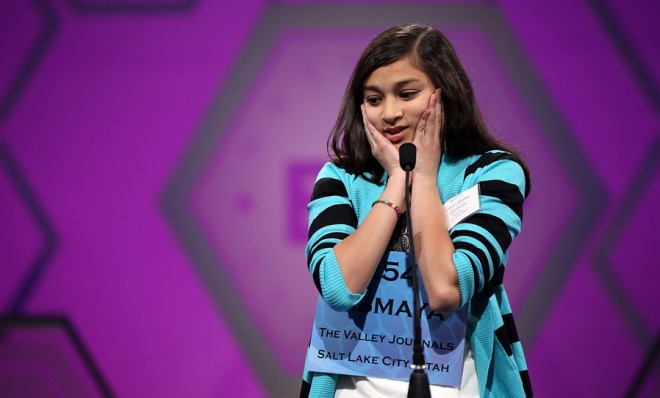What the spelling bee loses by adding definitions
Scripps is turning its National Spelling Bee into a vocabulary quiz. B-A-D D-E-C-I-S-I-O-N.


A free daily email with the biggest news stories of the day – and the best features from TheWeek.com
You are now subscribed
Your newsletter sign-up was successful
Last week, the organizers of the Scripps National Spelling Bee announced that for the first time in the event's 86-year history, contestants will be tested not just on the spelling of words, but on their definitions. Seems like a good idea, right? It makes the hours spent learning these words a little more useful. The kids won't just be learning superficial letter patterns, but meanings. As director Paige Kimball explained, the change "represents a deepening of the Bee's commitment to its purpose: to help students improve their spelling, increase their vocabularies, learn concepts and develop correct English usage that will help them all their lives."
But is that what the Bee should be about? At Slate, Stefan Fatsis vigorously disagrees:
The goal of a spelling bee is to spell words correctly. Meanings, in this instance, don't matter. The order of the letters is what matters. How the speller gets there — by learning definitions or by employing other mnemonic techniques — is, or should be, completely up to the speller.
What the Scripps people are saying is that spelling on its own isn't educational enough, that simply learning the correct sequence of letters that constitute the correct spelling of a word is a lesser exercise without the simultaneous assimilation of the word's meaning. That's high-minded — who can argue with making kids know the definitions of the words that come out of their mouths? — but it's also small-minded. It's perfectly fine and, in fact, healthy to use language narrowly, to strip words of their context and history and meaning, and to teach kids that that's OK. [Slate]
Fatsis, as a passionate Scrabble player, understands the value of the "useless" pursuit. And most of us understand this implicitly. Who doesn't have a hobby? Something they do for its own sake without regard for practical returns? What is the point of fly fishing, painting, or high school cheerleading competitions? Sure, you can think of ways to sell these activities as useful — fly fishing fosters quiet patience and an appreciation for nature, painting develops visual acuity, cheerleading encourages physical fitness and teamwork — but these are afterthought justifications. You can think of such justifications for spelling bees, too — they promote focus, concentration, and an awareness of linguistic patterns. But these justifications are not why anyone sticks with any of these hobbies. People do these things because they are difficult enough to bring a feeling of accomplishment, masterable enough to bring a sense of satisfaction, and enjoyable enough to bring a spark of delight.
The Week
Escape your echo chamber. Get the facts behind the news, plus analysis from multiple perspectives.

Sign up for The Week's Free Newsletters
From our morning news briefing to a weekly Good News Newsletter, get the best of The Week delivered directly to your inbox.
From our morning news briefing to a weekly Good News Newsletter, get the best of The Week delivered directly to your inbox.
People generally don't have a problem with the hobbies of others as long as they don't hurt anyone. But the closer a "useless" pursuit is to something language- or school-related, the harder it is for us to see the value. It's so close to being educational — a word which has come to stand for "conferring an advantage in a competitive marketplace" — why not maximize its practical benefits?
Well, because the maximizing of practical benefits often comes at the cost of the spark of delight. Fatsis points out that the changes to the bee mean that "while the kids will spend less time spelling standing up — the fun, traditional part of bees — they'll spend more sitting down, answering questions on a computer screen (50 in the preliminary round and 26 in the second), less than half of which will have to do with spelling… The vocabulary quiz turns the Bee from a spelling competition into a standardized test. Just what kids need more of."
Doubtless, once kids have gotten used to the changes and adjusted the way they prepare for the bees, most of them will find a way to delight in the definitions portion as well. They're word people, and word people like definitions. But these contestants will not necessarily be doing anything more useful. They will still be filling their heads with obscure archaisms. And why shouldn't they? It is an amazing fact about humans that they can find accomplishment, satisfaction, and delight in doing almost anything for its own sake. And that's an ability to be cherished… for its own sake.
A free daily email with the biggest news stories of the day – and the best features from TheWeek.com
Arika Okrent is editor-at-large at TheWeek.com and a frequent contributor to Mental Floss. She is the author of In the Land of Invented Languages, a history of the attempt to build a better language. She holds a doctorate in linguistics and a first-level certification in Klingon. Follow her on Twitter.
-
 Magazine solutions - February 27, 2026
Magazine solutions - February 27, 2026Puzzle and Quizzes Magazine solutions - February 27, 2026
-
 Magazine printables - February 27, 2026
Magazine printables - February 27, 2026Puzzle and Quizzes Magazine printables - February 27, 2026
-
 ‘The forces he united still shape the Democratic Party’
‘The forces he united still shape the Democratic Party’Instant Opinion Opinion, comment and editorials of the day
